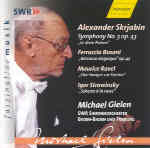As to Hänssler’s “DDD” indication on the back sleeve of this 20th-century grab bag, I’m certain the 1975 recording of Scriabin’s Third Symphony derives from an analogue rather than digital source tape. In any event, Michael Gielen plays up this big work’s proximity to early Schoenberg, stressing linear clarity over color and sensuality and paying heed to the composer’s frequent directives of mood (“tragique”, mystérieux”, jòyeux essor”, and the like) without overreacting. The sprawling first movement’s climaxes are expertly gauged and the string pizzicatos at the finale’s outset boast unusual point and purpose. The SWR orchestra, however, hadn’t yet acquired the tonal sheen and polished execution characteristic of its work with Gielen during the following decades. You could imagine, for example, heftier string tone in the soaring, lyrical passages, and more precise attacks in the slow movement’s soft, exposed tuttis. For ravishing orchestral color and superior realization of Scriabin’s dynamic extremes, the Muti/Philadelphia “Divine Poem” remains in a class by itself.
Interestingly enough, the cushy, atmospheric qualities typifying Gielen’s account of Stravinsky’s Scherzo à la russe perfectly suit Scriabin, but I prefer the more incisive, acerbic Dorati/London Symphony classic on Mercury, with its more characterful interplay between solo violin and ensemble in the cimbalom-inspired passages. The Busoni and Ravel selections, though, are simply gorgeous. I love the textural differentiation Gielen obtains from Busoni’s low-register scoring, where the bassoon, bass clarinet, and horns effortlessly weave in and out and around each other. And the Ravel’s prismatic, transparent balances prove Gielen’s long-held affinity for this composer, revealed to a fuller extent in the conductor’s lean, exciting complete Daphnis et Chloe (also with the SWR orchestra, available on Arte Nova). In sum, the Scriabin and Stravinsky are very good, but the Busoni and Ravel are superb. [7/26/2002]
































